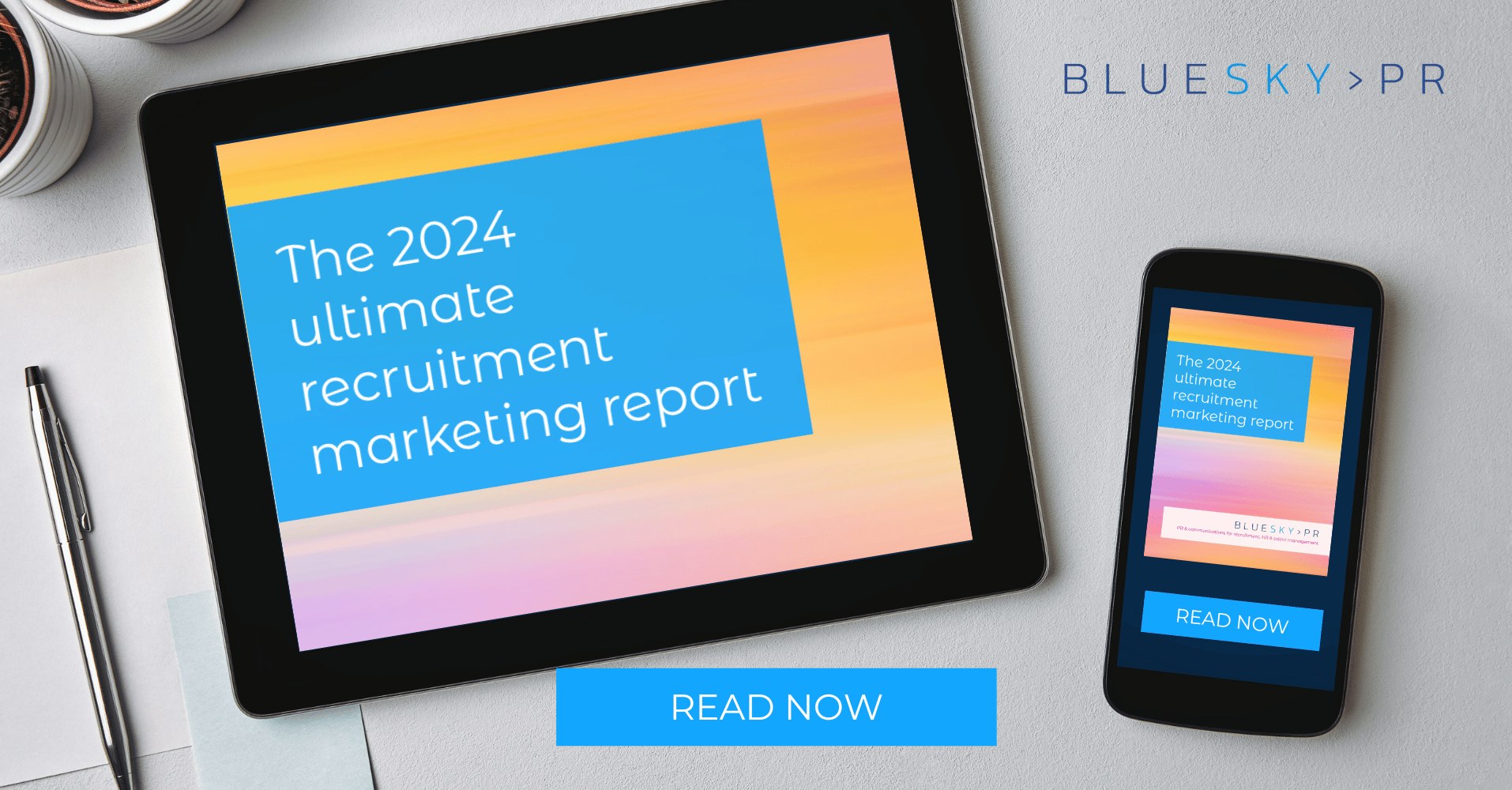With the latest research from APSCo finding that jobs for marketeers were up 130% in 2021 on 2020 and recruitment agencies themselves victims of the ‘great resignation’ - if you're struggling to hire a recruitment marketer then perhaps it's time for to consider outsourcing all or part of your marketing function?
Whether it be on a short-term basis while you work on upskilling junior staff or on a more long-term basis, now is the time for recruitment adaptation and recruitment evolution. At Recruitment Agency Expo, Ann Swain and James Osborne were both talking about just that. Recruitment is an industry that cannot afford to stand still, it has to constantly grow and adapt to the needs of your clients and candidates.
So if you are currently short of marketing resources, what are your options?
Option 1: Upskilling and reskilling
Mentoring

We often find that marketing people within recruitment firms are working in a silo without any or much support – having a mentor to check in with and discuss ideas, someone to help them make decisions, someone to steer them in the right direction, suggest areas of improvement and where training would be beneficial, is a huge benefit to both their personal and professional development. And it is a quick and easy way to upskill existing junior marketing staff. We ourselves offer a mentoring service that I’d be more than happy to discuss with you.
Support is an instrumental part in upskilling internal employees - offering guidance whether it's part of a specific mentoring program or by osmosis from senior staff or an external agency they work side-by-side with is a great way for them to develop new skills and gain on-the-job training.
Workshops
In the past we have run multiple training workshops on behalf of clients (both in person and virtually) – these are really interactive with exercises to suit the goals of each business and those being trained. Topics we’ve worked on with recruitment marketers include:
- How to write content
- Where and how to post your content
- How to measure the success of your content
- How to use a content strategy
- Putting together a media strategy
- Finding stories, angles and media targets
- Identifying guest blogging opportunities
- What to do if you’re having a PR crisis
- How to engage your audience
- How to measure return investment
- How to stretch your content
- How to use marketing materials within business development
- Competitor analysis
- Target persona mapping
- Organic versus paid social
Please get in touch if this is something you might be interested in.
Webinars, seminars and certifications

While they are not specific to the recruitment industry (we ourselves offer a number of free webinars specifically for recruitment marketers on our website), there are lots of free and paid for marketing and social media training sessions and certifications that both junior and senior members of your marketing team will benefit from – here is a list of some resources we think your marketing team will find useful to boost their digital marketing skills:
- HubSpot Academy – free marketing courses and certifications on almost every subject
- Cambridge Marketing College – where our very own apprentices’ study
- The Chartered Institute of Marketing
- LinkedIn Online Marketing Tutorials (one month free at the time of writing)
- Twitter Flight School
- SEMRush Digital Marketing Courses
- Google Skillshop
- Canva Graphic Design Basics
- Wordstream PPC University
- Sendinblue Academy Email Marketing Course
- Yoast Online SEO Training
- Google Digital Garage
- Meta Blueprint Social Media Marketing Professional Certificate
Option 2: Outsourcing all or part of your marketing activities
Why would you want to?

Being unable to find the right candidates to fill the vacancies in-house is one reason, the other is time.
Content writing in particular is one aspect that takes a very long period of time – just Google the average length of time it takes to write a blog post and you’ll find most state 3-4 hours. Now depending on the competitiveness of the sector you recruit within, you may be needing to produce blogs daily, weekly, bi-weekly, bi-monthly… which means dedicating a large amount of time (and that’s before you start thinking about all the other types of content you need to be producing such as white papers, survey reports, e-books… ). Your consultants certainly don’t have the capacity to be writing these – but they can spare 5-10 minutes to have a conversation with either an in-house marketeer or an agency who can write the content for them.
Can I afford it?
The impact of regular search engine optimised blog content can be anywhere between 25% and 200% increase in your web traffic (depending on the health of your website to begin with), which in turn delivers increased candidate applications and increased client engagement. This leads to more business and to more placements. The number of placements that you make will by far exceed the amount that you've spent in generating that content marketing – according to optinmonster, B2B marketers who blog on a regular basis get 67% more leads, and a poll by Search Engine Journal found that 49% people said that organic search offers the highest ROI when compared to paid search, email and social media, and according to Databox 70% of marketers see SEO as more effective than PPC.
What would I need to commit to?

How often you need to be blogging and how long your blogs should be, is going to be dependent on your industry and how competitive the terms you are looking to rank for are, you may need to be writing 2000 word plus blogs, you may only need up to 1000 words – that needs to be analysed and understood and checked back on regularly to ensure you achieve and stay in the search engine position you are aiming for (according to Zero Limit Web, the first five organic results account for 67.60% of all clicks). And on that point you can’t just leave your content on your site once it’s written to stagnate, articles and blog posts need updating to remain relevant otherwise their ranking will wane and you’ll start to see a higher bounce rate.
Then if we look at value-added longer form content that you might offer gated on your website, provide at events, send to current clients, or even to prospective clients as part of your business development, these are often upwards of 3000 words and take a great deal of research to produce. With the candidate-led market that we currently facing then content to attract candidates could also include things like salary surveys, reports on workplace diversity initiatives and the kind of benefits that are being offered these days, research into remote versus hybrid working, the options are endless. Your consultants are talking to candidates on a daily basis, you have a huge amount of insights that can just be repackaged up and provided to your audience and it's things they want to know, things they aren't certain about, things they don't have access to and information on themselves, content that solves a problem for your audience, that convinces them to come and check out your business and then in turn engage with you further. And the great thing about this kind of content is that you can track the new business it brings in and the conversations generated.
With how competitive the recruitment landscape is at the moment, you may also want to consider things like award submissions to stand out from your competitors. Now these can take a huge amount of time to put together and need to be really targeted to exactly what the judging criteria is. And this is something an agency can do for you by conducting a series of interviews with key stakeholders within your business to extract the necessary information. It could be done as a standalone piece of work or as part of ongoing marketing support. We ourselves having judged the APSCo Awards for the past few years are experts at understanding exactly what the judges are looking for from submissions.
__
Essentially, content marketing is a big time commitment and you need someone who is dedicated to doing that within your business if you want to really see success, the alternative is to outsource this and free up the time of your internal resources to focus on other activities. Perhaps the best thing for your recruitment marketing strategy may be a hybrid model, where you have a certain amount of marketing support within the business but could do with some more while you’re struggling to hire someone externally or working to upskill the staff you have. The key thing, whether you are working with your internal marketing division or a marketing agency, is collaboration and regular communication. Working together to produce content that feels authentic is incredibly important - so whether your marketing material comes from the director, or from one of your consultants, it truly shows your expertise and it really sounds like it's coming from those people. And the key to that is to see marketing, whether it’s in-house or an agency, as an extension of your team - someone go to for advice on leads and engagement but who can also come to you for your expertise on what your audience wants to know, questions they are asking and trends you’re noticing.
Interested in discussing recruitment marketing mentoring or support? I’d love to hear from you.



